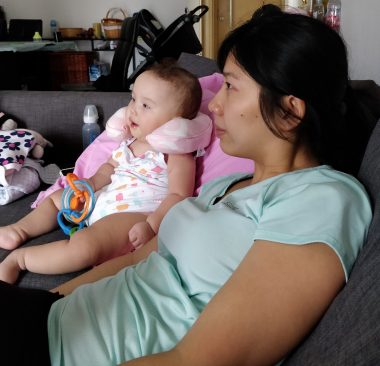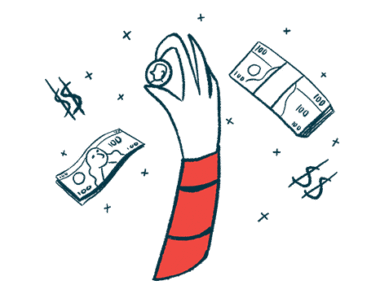Be Mindful of the Signs of Depression
Written by |

Several years ago, sleepless nights plagued my wife, Judy, and me. This in turn allowed the fog of confusion to seep into every aspect of our life as we searched for answers regarding the mysterious affliction of our daughter, Rylae-Ann. Everyday challenges were only compounded by the emergency room admissions and extra support our daughter required.
There was no time to think about our pain or lack of energy because our daughter was experiencing much worse. We knew we were tired and confused, but what we didn’t realize was that depression was nipping at our heels, waiting for us to trip.
Once the puzzle was solved and Rylae-Ann was diagnosed with aromatic l-amino acid decarboxylase (AADC) deficiency, we could develop a support network and a plan to support our daughter. After we understood AADC deficiency symptoms, we were able to take proactive steps to avoid hospital admissions and provide better care.
The structure and support afforded Judy and me time to reflect on our ordeal. One important point from our discussions was how close we were to succumbing to depression. Following are signs we noticed that other families affected by rare diseases or neuromuscular disorders may also be experiencing.

Rylae-Ann and her mom, Judy, spend good days indoors together on the sofa. (Photo by Richard E. Poulin III)
Hopelessness
For parents of children with rare diseases, feelings of helplessness and hopelessness are understandable. According to the National Organization for Rare Disorders, 95% of the more than 7,000 rare diseases have no treatment options. However, there is hope on the horizon with the potential of gene therapy. Judy was wrecked with these facts, which presented as crying and genuine fear. We reassured each other, but this was a challenging hurdle to overcome.
Loss of interest
For us, the loss of interest was due to the care we needed to provide our daughter. Even if we had time for an activity and Rylae-Ann was having a good day, we would opt to stay inside. We felt guilty going out and leaving the other parent to provide care.
Appetite changes
Looking back at pictures, we were shocked at how gaunt and weak we looked. This was due to us not eating right. When you are experiencing the mental pain of having a sick child, you don’t even notice hunger.
Before Rylae-Ann was born, both of us were very active, enjoying outdoor activities. Our hobbies kept us in great shape. When Rylae-Ann was born, we thought we would do even more activities. Instead, we were stuck indoors and even called ourselves the “Sit On Sofa Club” or S.O.S. Club for short.
Sleeplessness
Sleeplessness was the most noticeable sign of our depression. Every day we were tired. Tiredness became an accepted part of our life. Rylae-Ann didn’t have an adequate sleep cycle, so we worked together to soothe her to sleep. If she did fall asleep, we slept in awkward positions because waking her was not an option.
At the time, I attributed most of my issues to not sleeping. I’m sure it contributed, but stress makes thinking much more difficult. We noticed we had trouble focusing, making decisions, and remembering things.
Anger
Judy and I didn’t direct our anger or frustration toward each other. We relied on each other, so we didn’t want to upset the other caregiver helping to carry an unbearable load. However, there was a lot of anger, especially at the beginning. I was mad at the world, the disease, and even random people who were living happy lives. The worst was hearing others complain about something trivial while my daughter faced pain every day.
No energy
The energy we did have, we allocated exclusively toward our daughter. This meant we no longer did activities, and if we had downtime, we would try to sneak in a nap. We had more physical complaints, such as headaches, back pain, aching muscles, and stomach pain.
Worthlessness
I am my worst enemy. Judy and I continue to critique our efforts and list the things we should have done today. We now provide better feedback and are much easier on ourselves, but early on it always felt like we weren’t doing enough.
Reckless behavior
Thankfully, we didn’t go deep into this realm, but I can see how easy it would be when struggling with depression. Judy took up having the occasional cigarette, and I had a bit more whiskey than normal. However, with sleep minimized, these habits never seemed appealing. If we had downtime, we sought sleep. Also, caring for our daughter required a great deal of effort, and substances only made it more difficult.
Coffee might not seem like it would fit in this category, but I was living off caffeine. I had no problem skipping meals, but not having a cup of coffee was not in the realm of possibility.

We are about to take Rylae-Ann out more and explore the world. (Photo by Richard E. Poulin III)
Looking back
We all have good and bad days. However, if you or a loved one consistently feel sad or helpless, immediate attention should be given. Applying a methodical approach can keep depression at bay.
Today, Judy and I are in a much better place, and it has allowed us to reflect. The signs of depression were there, but we unknowingly attempted to hide or downplay them. However, our family remained by our side while we devoted ourselves entirely to Rylae-Ann.
If you identify with this list, don’t be scared to reach out. Having a support network is essential. Not only does it help you, but it allows your child to have better care. For my family, that begins by having a strong marriage. The parents of a child offer them the greatest love, support, and hope. Support your partner in your united journey and then extend that support network and safety net.
Note: AADC News is strictly a news and information website about the disease. It does not provide medical advice, diagnosis, or treatment. This content is not intended to be a substitute for professional medical advice, diagnosis, or treatment. Always seek the advice of your physician or other qualified health provider with any questions you may have regarding a medical condition. Never disregard professional medical advice or delay in seeking it because of something you have read on this website. The opinions expressed in this column are not those of AADC News or its parent company, Bionews, and are intended to spark discussion about issues pertaining to aromatic l-amino acid decarboxylase deficiency.






Leave a comment
Fill in the required fields to post. Your email address will not be published.